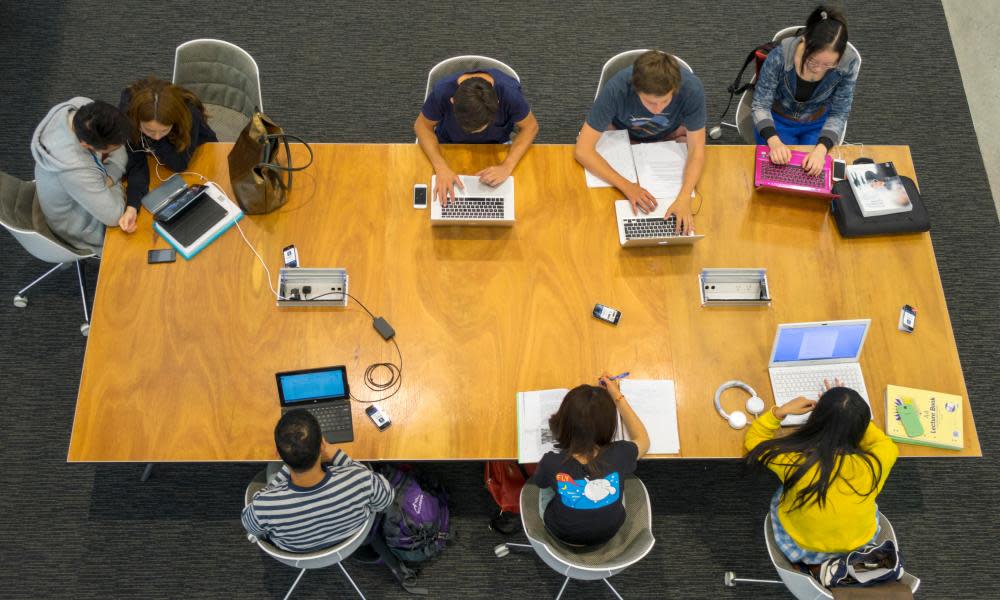Regional universities push to trial a return of international students to Australia

Regional universities are calling for a relaxation of Australia’s travel ban to first be trialled for international students who commit to studying outside of capital cities, with charter flights, special Covid-19 pre-departure testing and alternative quarantining arrangements as an incentive to boost numbers at regional campuses.
The calls from the Regional Universities Network come after the House select committee hearing on regional Australia on Thursday heard that universities have lost hundreds of millions of dollars in international student fees due to Covid-19.
That figure included a shortfall of more than $100m at Central Queensland University, whose student body was 39% international in 2018, and a loss of revenue of about $64m at Charles Sturt University, which had an international student share of about 32% in 2018.
Caroline Perkins, the executive director of RUN, told the Guardian the sector “absolutely” supports the NSW premier Gladys Berejiklian’s intention to fast-track the return of international students, arguing the initiative – which is reported to have a quota for regional universities – should instead be “piloted” with foreign fee paying-reliant regional universities struggling most from the pandemic.
Related: 'We feel abandoned': international students in Australia facing coronavirus alone
Reports suggest the NSW plan aims to allow international students to isolate in their own supervised accommodation, as opposed to the taxpayer-funded 14-day hotel stays that all overseas arrivals into NSW are currently subject to. The health minister, Greg Hunt, on Wednesday said he was open to separate “supervised, stringent quarantine” processes for international students.
While the federal government has flagged it will “consider” international student travel under stage 3 of lockdown, expected by July, Perkins wants regional universities to be the first campuses trialled for the return.
On Thursday, Berejiklian said many returning citizens who lived in other states had been subject to quarantine in Sydney, and that “there’s no reason why in the future we shouldn’t consider allowing students to go through that process to make sure they’re 100% safe before they go to university.”
The opposition education spokeswoman, Tanya Plibersek, told the Guardian that the federal government should support any moves from the NSW government to speed up the return of international students.
“If the NSW Liberal government can recognise how critical universities are for our economy and for jobs, why can’t Scott Morrison?” she said.
“We’re already seeing hundreds of jobs lost at unis in regional areas, which will have a huge impact on their local economies. The federal government should stop turning its back on these workers ... We look forward to welcoming international students back to Australia as soon as it’s safe to do so,” Plibersek said.
The Guardian understands international students support about 95,000 jobs in NSW.
A Victorian government spokesman told the Guardian international students support 79,000 jobs in the state, and the premier, Daniel Andrews, will discuss the return of international students at national cabinet.
The Queensland state development minister, Kate Jones, told the Guardian more than 20,000 in the state rely on international education, and that “we can’t afford to lose this industry”.
As part of the regional university prioritisation, Perkins said that while countries such as India, Nepal and China have traditionally been a strong source of international students, state governments should look to stage “pilots” with cohorts of students “where Covid-19 is relatively under control”, including South Korea and east Asian countries.
Perkins – whose RUN represents seven regional universities across Queensland, NSW and Victoria that include the University of New England, Southern Cross University, Charles Sturt University and Federation University – said while the campuses rely on international students, administrators are realistically assuming a full return of foreign students will only be possible by 2021.
Logistically, Perkins said regional campuses supported a strict testing regime for the first cohorts of international students – which has previously been discussed in national cabinet – that would include testing both pre-departure to Australia and post-arrival.
Perkins believes Southern Cross University’s Gold Coast campus, which is located adjacent to Coolangatta international airport, is an ideal location to trial for one of the first international student cohorts to travel to, because of the ability to charter direct flights from overseas, and the ease of transporting arrivals to the nearby campus accommodation. She also noted Griffith and Bond universities have campuses on the Gold Coast.
Related: 'A downward spiral': coronavirus spins Australian universities into economic crisis
According to an April report from Victoria University’s Mitchell Institute, modelling forecasts a loss of between $10bn and $19bn to the Australian university sector’s income between 2020 and 2023 when compared to 2019 international student revenue.
The report also estimates that Australia’s economy “faces a wider loss of between $30bn and $60bn” between 2020 and 2023 when the loss of international student engagement across the Australian economy – in terms of spending and jobs – is taken into account.
While government figures show international student revenue was $12bn last financial year, this does not take into account the value of their spending and work in the economy, widely considered to be several billion dollars.
The calls to prioritise regional campuses come as the Group of Eight – which comprises elite universities including the University of Sydney, the University of Melbourne, and the Australian National University – proposes a “secure corridor” to plan to return international students.
The plan, which has been presented to the federal and state governments, also includes similar alternatives to taxpayer-funded hotel quarantines, and hopes to allow students stranded overseas to begin or renew their degrees by the first semester of 2021.

 Yahoo News
Yahoo News 
